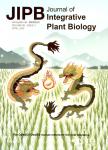Autophagy in plants: Physiological roles and post-translational regulation
Autophagy in plants: Physiological roles and post-translational regulation作者机构:State Key Laboratory of BiocontrolGuangdong Provincial Key Laboratory of Plant ResourcesSchool of Life SciencesSun Yat-sen UniversityGuangzhou 510275China
出 版 物:《Journal of Integrative Plant Biology》 (植物学报(英文版))
年 卷 期:2021年第63卷第1期
页 面:161-179页
核心收录:
学科分类:0710[理学-生物学] 07[理学] 071009[理学-细胞生物学]
基 金:supported by the National Natural Science Foundation of China (Projects 31725004 and 31670276 to S.X.and Project 31800217 to H.Q.) the Natural Science Foundation of Guangdong Province,China (Project 2017A030308008to S.X. and Project 2018A030313210 to H.Q.) Sun Yat-sen University (Project 19lgpy202 to H.Q.)
主 题:autophagy physiological roles post-translational regulation
摘 要:In eukaryotes, autophagy helps maintain cellular homeostasis by degrading and recycling cytoplasmic materials via a tightly regulated *** the past few decades, significant progress has been made towards understanding the physiological functions and molecular regulation of autophagy in plant cells. Increasing evidence indicates that autophagy is essential for plant responses to several developmental and environmental cues, functioning in diverse processes such as senescence, male fertility, root meristem maintenance, responses to nutrient starvation,and biotic and abiotic stress. Recent studies have demonstrated that, similar to nonplant systems,the modulation of core proteins in the plant autophagy machinery by posttranslational modifications such as phosphorylation, ubiquitination,lipidation, S-sulfhydration, S-nitrosylation, and acetylation is widely involved in the initiation and progression of autophagy. Here, we provide an overview of the physiological roles and posttranslational regulation of autophagy in plants.



